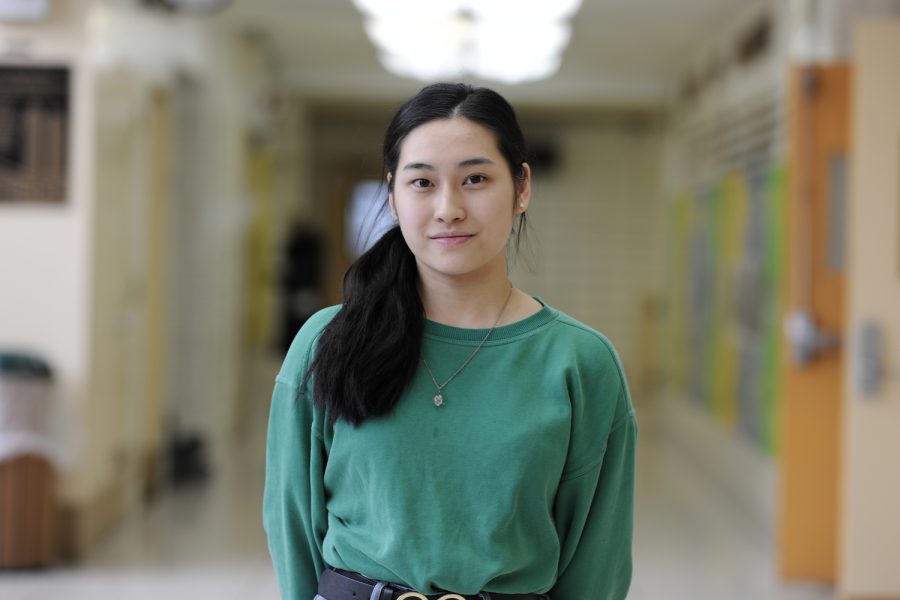“Where Are You From?”
The Ethnicity Question
Olivia Chen ’20 is one of many Americans asked, ‘Where are you from?” by those who wish to learn about her ethnicity.
Over the summer, I went on a trip to Quebec with my family. When we arrived at the hotel, we were told that our room was not ready, so we waited in the lobby. One hotel staff member approached us to let us know that our room would be ready shortly. There was a moment of awkward silence until he asked, “So, where are you from?”
My father let the man know that we came from New York City for a family trip. As he was explaining, I noticed a change in the man’s expression. It seemed as if he was going to open his mouth to interrupt. I could sense his anticipation to ask us the question, “Where are you really from?”
At that moment, I already knew it was coming. My father explained in a calm tone, “Our daughters were born in America, but my wife and I were born in Korea.” I could tell he knew exactly what the man was asking, and I saw the man’s satisfaction that he finally knew the answer.
Recently, I was thinking about this encounter and I realized that I still don’t know how to feel about it. I know I’m not the only one who as had this experience. In a nation as diverse as America, there are a multitude of ethnicities that we are bound to come in contact with. Naturally we’re eager to learn more about each other and our heritages. But where do we draw the line?
The obvious intention when asking this question is to determine one’s ethnicity. Usually, it’s just an innocent question that acts as a conversation starter. It’s asked out of general curiosity about a heritage. In that context, it can be an interesting question that some are eager to answer.
However, it may seem to others an example of ignorance, especially to those who have lived in America their entire lives; asking someone where they are “really” from can suggest that because they look “different” or come from a different ethnic background, they are not “truly” American, which makes many feel like outsiders in a seemingly welcoming country.
So, is there a problem with this question? It seems to depend on the person who asks and how it is received by those who answer.
It can be agreed that “where are you from?” is not the best way to ask about ethnicity. Suzie Montag ’20 thinks that this question is too broad. “As a biracial woman who is often perceived as ethnically ambiguous, I definitely get this question more than average,” Montag said. “In a country like America where nearly everyone is an immigrant or the descendant of one, the question ‘where are you really from?’ might make the respondent feel as if the culture they identify with, that they’ve grown up knowing, is being disregarded as part of their identity.”
Similarly, John Choi ’21 feels that this isn’t a great way to discuss someone’s identity. “I think that the question is very ignorant and people don’t realize it,” Choi said. “There are plenty of appropriate ways to ask about someone’s ethnicity without assuming they aren’t American just because they appear to be different.” It is clear that those who are asked the question are not very fond of the way that it is presented to them.
“We live in an globally connected world, and not learning about others’ backgrounds makes you more ignorant than not learning and continuing to be unintentionally racist,” said Olivia Chen ’20.
The ethnicity question can also be perceived as racist, but Gidget Rosen ’20 believes that it is quite the opposite. “I think that it prevents generalization and racism, primarily by avoiding declaring someone the wrong race based upon how they look,” Rosen said. “I believe it is usually meant in a respectful way that intends to maintain a politically correct tone.”
It is clear that the perception of the question depends on the person and how they feel it is being asked to them. Thus, “Where are you from?” is a question whose connotation depends on the respondent, and should generally be avoided. There is nothing wrong with wanting to know more about the heritage and culture of others; it is how we can learn more about each other and can create a more welcoming and inclusive society. Thus, Olivia Chen ’20 believes that we should ask about ethnicity with a genuine interest in learning about it. “We live in an globally connected world, and not learning about others’ backgrounds makes you more ignorant than not learning and continuing to be unintentionally racist,” Chen said.
It is difficult to find a way to ask someone what their ethnicity is without seeming ignorant or rude. Just keep in mind: when wanting to learn about others’ ethnicity and cultural heritage, make it clear that there is no intention of being ignorant or unintentionally racist, and an honest response is bound to be given.
Jiwon (Estee) Yi is a Senior Staff Reporter for the ‘Science Survey’ and an Editor-in-Chief of ‘The Observatory.’ Her favorite aspect of journalistic...

